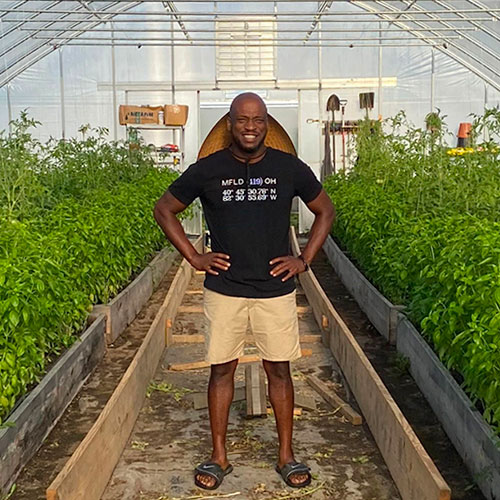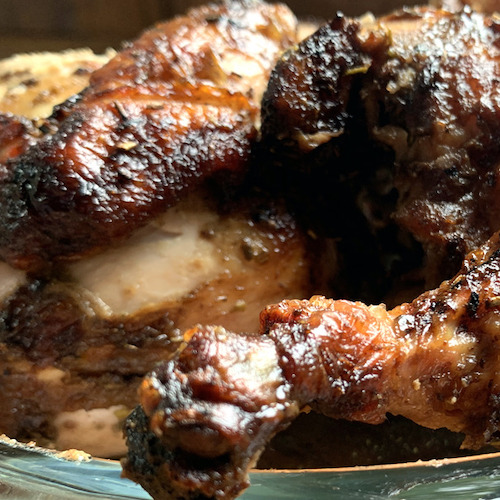Black dreamers have long sought better lives, many in the Midwest. Between about 1915 and 1970, millions went north in an exodus that historians now call the Great Migration, taking jobs and starting new lives in heartland cities including Chicago, Detroit, and Cleveland. They were continuing a tradition that was already generations old by then, following Black pioneers like those who founded the farming communities of Beech and Roberts in Indiana in the 1830s.
In the same spirit, chef Adrian Lipscombe announced her Wisconsin-based 40 Acres and a Mule Project this past June. Referencing Civil War general William Tecumseh Sherman’s infamous Field Order No. 15, which laid out a post-war land redistribution program that never came to pass, Lipscombe wants to create a forty-acre refuge for Black food culture and agriculture in the state’s fertile Coulee Region. It’s the next step in a journey that has taken the multi-talented chef and entrepreneur—also a farmer and an urban planner—from her native Texas to the Upper Midwest, and from a backyard farm in San Antonio to the James Beard House in New York.
“Owning land means you have freedom, and that you have ownership within the USA.”
Lipscombe has been around agriculture all her life. Her great-grandfather owned land across Texas, which he was able to pass on to his children when he died at the age of ninety-seven in 2011. The chef grew up working some of that acreage, but she launched her first major farming project on her own property. While she was pursuing her master’s degree in architecture, she and her husband built one of the first urban homesteads in central San Antonio. What started with a few raised beds ended with chickens, beehives, and a giant aquaponic system. It was both a practical project and a statement about self-sufficiency and independence. “Owning land means you have freedom, and that you have ownership within the USA,” she told Food & Wine in June.
Black farmers owned more of the country in her great-grandfather’s time. In 1920, per USDA statistics, about 950,000 of America’s farmers—close to 15%—were Black. Per the 2017 Census of Agriculture, that number has declined to 45,000. After decades of targeted harassment, those farmers own less than one percent of the nation’s farmland. The statistics tell the story. From 1920 to 1997, the number of white American farmers declined by 66%. The number of Black American farmers decreased by 98%. Today, 1.3% of farmers in America are Black. That number drops to just .07% in Wisconsin.
Lipscombe was skeptical when she first arrived in LaCrosse, on the invitation of local activist Andrew Londre. For one thing, it was January. But beyond the winter weather, she saw an opportunity to combine her skills and passions to serve a community. In 2016, she moved north, and she and Londre partnered to launch the urban planning and design firm Urbanlocity. They helped transform the city’s Old Towne neighborhood into the new Uptowne. The same year, the busy University of Texas Ph.D. candidate staked her claim at the address of her Uptowne Cafe & Bakery.
The restaurant serves wholesome fare informed by the chef’s heritage and reverence for local agriculture—sorghum-drizzled cornbread, brisket-and-collard hash, burgers made with local grassfed beef. Its menu and message got the attention of the James Beard Foundation, the New York-based nonprofit that hosts what are often called the Oscars of food and beverage in the U.S.
The group’s leaders chose Lipscombe to host last year’s celebration of Juneteenth, a holiday that has marked the end of slavery since the late 1800s. She invited chefs from Texas, Mississippi, and Maryland, plus a couple of New Yorkers, to join her at the Beard House in Manhattan. Serving chow chow, butterbeans, shrimp gravy, and barbecued quail, they told a multi-course story about the Black experience in America. Just a few months later, to the Beards invited Lipscombe back to lead a second dinner, simply titled “Southern Black Traditions.”
Then, the pandemic hit. Two months after much of the country went into lockdown, police killed George Floyd in Minneapolis, two-and-a-half hours up the Mississippi from LaCrosse. Protestors took to the streets across the nation, demanding the recognition and respect that she has long pursued with her work as a chef and urban planner. Strangers began to send her money, she told Wisconsin Public Radio. They wanted to support a Black visionary and a Black-owned business, and as she considered how best to use their donations, she thought back to her property in Texas.
Lipscombe plans to put a seed bank, archives, and gardens showcasing traditional crops and techniques on her forty acres. Her 40 Acres and a Mule Project has continued to grow in scope as support has poured in from around the globe and the project has surpassed its initial fundraising goal of $100,000.
Now, her vision is coming to life. Recently, she announced the purchase of thirty-eight acres in St. Helena, South Carolina, with the agriculture-and-cuisine-focused nonprofit Muloma Heritage. She is planning to house Black foodways archives there, she says, in the coastal region where so many enslaved Black people entered the U.S. But she’s still looking for her sanctuary in the Midwest. She’s just trying to find the right forty acres. Click here to support her GoFundMe.




